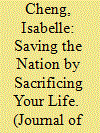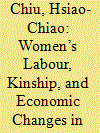|
|
|
Sort Order |
|
|
|
Items / Page
|
|
|
|
|
|
|
| Srl | Item |
| 1 |
ID:
168154


|
|
|
|
|
| Summary/Abstract |
With the nationalist government – Kuomintang (KMT) – retreating from mainland China in 1949, some 600,000 military personnel relocated to Taiwan. The military seized former Japanese colonial properties and built its own settlements, establishing temporary military dependents’ villages called juancun (眷村). When the prospect of counter-attacking the mainland vanished, the KMT had to face the reality of settling permanently in Taiwan. How, then, did the KMT’s authoritarian power enter the everyday lives of its own support group? In this article I will focus on the coercive elements of KMT authoritarianism, which permeated these military villages in Taiwan. I will look at the coercive mechanisms through the analytical lens of Foucauldian discipline. I argue that disciplinary techniques such as surveillance, disciplining of the body and the senses, as well as the creation of morality regimes played an important role in the cooptation of village residents into KMT authoritarianism by normalising and naturalising it.
|
|
|
|
|
|
|
|
|
|
|
|
|
|
|
|
| 2 |
ID:
168150


|
|
|
|
|
| Summary/Abstract |
This article explores how state institutions and party organs of the Kuomintang used various means of exercising power and projecting authority in order to shape the literary scene and literary production in Taiwan during the early post-war period (1945–1949). Censorship is examined from two complementary perspectives. First, integrating the Taiwanese case into a broader political and social context, the presentation focuses on the legal framework of the publishing law of Republican China and on regulations propagated in local official bulletins. Second, the article analyses censorship as a practice and set of procedures. This second part is based on the archival files of Taiwan Historica, which holds official documents from both early post-war governments. The archival material unveils some of the motivations behind censorship practices, and helps us to understand chosen strategies to legitimise sociocultural norms.
|
|
|
|
|
|
|
|
|
|
|
|
|
|
|
|
| 3 |
ID:
168155


|
|
|
|
|
| Summary/Abstract |
This article asks why sorghum liquor, once a drink choice representing the taste of a dominant class, became a token of Jinmen identity among the islands’ dominated local population. Being a Cold War battlefield, war-stricken Jinmen became a symbol of the Kuomintang government’s determination to recover mainland China. Military authoritarianism transformed Jinmen’s society in countless ways, including consumer fashions. The mass production of sorghum liquor began in 1953, with the military promoting its taste and establishing consumption of the liquor as part of a masculine ethos. This inspired mimicry among local consumers. Sorghum liquor became a local “traditional drink,” and a signifier for an identity that revolved around its consumption. This development arose from local consumers seizing on their limited freedom by making this consumption choice and making it their own under military authoritarian rule. Consumption and taste thus gave new meanings to local identity and community subjectivity.
|
|
|
|
|
|
|
|
|
|
|
|
|
|
|
|
| 4 |
ID:
168149


|
|
|
|
|
| Summary/Abstract |
Introduction to Journal of Current Chinese Affairs 2/2018: The Making and Operation of Everyday Authoritarianism in Taiwan during the Cold War
|
|
|
|
|
|
|
|
|
|
|
|
|
|
|
|
| 5 |
ID:
168152


|
|
|
|
|
| Summary/Abstract |
The study adopts a critical discourse analysis approach to Chiang Kai-shek’s (CKS) internal nationalist propaganda and authoritarian discourse practices, investigating his New Year and National Day speeches in the 1950s. Authoritarian characteristics are evident in strategies such as legitimation, reification, or myth-making, in the antagonist categorisation of Self versus Other, in Self-glorification and the idolisation of the dead, in the hegemonic creation of commonality and unity, and in the metaphorical conceptualisation of reality. Patterns of idolising the dead serve to impose and legitimise CKS’s worldview among his citizens. Another pattern is CKS’s invention of imaginary compatriots within the “enslaved China” waiting for the best time to overthrow the “bandits’” rule. Reference to these imaginary agents indirectly presents to his audience a false but better impression of the Self, and a dimmer view of the communist bandits. A third pattern is CKS’s metaphorical use of language, such as references to communist China as a puppet regime of Russia.
|
|
|
|
|
|
|
|
|
|
|
|
|
|
|
|
| 6 |
ID:
168151


|
|
|
|
|
| Summary/Abstract |
This article examines the role assigned to citizens by the ideology of authoritarianism in the relationship between Chiang Kai-shek’s war to retake mainland China and the wartime regime constructed for fighting that war. Viewing Chiang’s ambition of retaking China by force as an anti-communist nationalist war, this paper considers this prolonged civil war as Chiang’s attempt at restoring the im-paired sovereignty of the Republic of China. Adopting the concept of “necropolitics,” this paper argues that what underlay the planning for war was the manipulation of the life and death of the citizenry and a distinction drawn between the Chinese nation to be saved and the condemned communist Other. This manipulation and demarcation was institutionally enforced by an authoritarian government that violated citizens’ human rights for the sake of winning the nationalist war.
|
|
|
|
|
|
|
|
|
|
|
|
|
|
|
|
| 7 |
ID:
168153


|
|
|
|
|
| Summary/Abstract |
The Nationalist Party retreated to Taiwan in 1949 after its defeat in the Chinese Civil War. Faced with a population explosion, economic recession, and a serious shortage of resources, the Nationalist government retained the “wartime regime” instituted during the civil war, while strengthening control of key foods – which significantly affected people’s daily life, and notably diet. This article argues that the purpose of implementing the wartime regime was not only to stabilise livelihoods, particularly to secure basic living conditions for a large number of soldiers and government employees; it also helped the Nationalist Party consolidate its authoritarian rule and establish a firm grip on national resources, facilitating national defence and economic development. The stringent control measures of the wartime regime caused, however, a gross imbalance between staple and subsidiary foods in the diet of local people, leading to consumption of excessive amounts of starchy staple foods and widening the gap between the diets of farmers and non-farmers.
|
|
|
|
|
|
|
|
|
|
|
|
|
|
|
|
| 8 |
ID:
168156


|
|
|
|
|
| Summary/Abstract |
This article uses the life stories of three women in Jinmen to demonstrate women’s economic agency in bettering the livelihood of their families in circumstances largely shaped by Cold War geopolitics and the authoritarian state’s military strategies. It argues that women’s devotion of their labour and earnings to their families was part of the reproductive processes of the kinship system, but also important to their building of social reputation and emotional ties with their loved ones. Moreover, the state’s campaign to protect traditional Chinese culture, framed within bipolar politics, supported the ideological reproduction of women’s primary roles being in the domestic sphere. While the lives of Jinmen civilians were significantly distorted in the Cold War era, their experiences of economic improvement and a certain stability in their ways of life – revolving around kinship – account for the ambivalence they now feel towards the period of authoritarian rule.
|
|
|
|
|
|
|
|
|
|
|
|
|
|
|
|
|
|
|
|
|